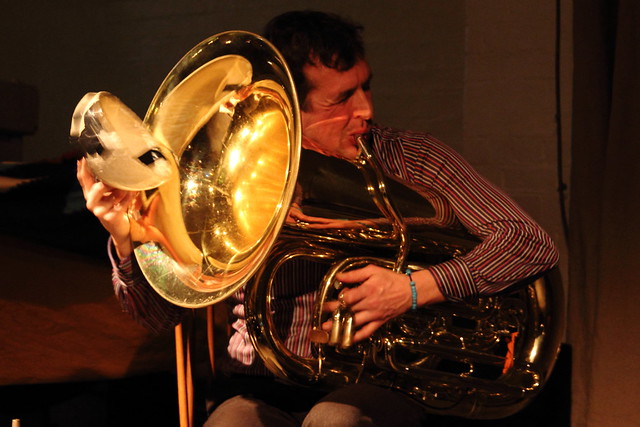
The fact that I don’t see many tubas in their natural habitats these days led me to wonder whether it had become some sort of endangered species. Let’s face it, it has never been the most practical of instruments – a bit too heavy for the marching band, too big for the gigging musician to take on public transport, too expensive to make it a suitable starting point for a learner musician, and perhaps too heavily outnumbered by the massed ranks of strings in the classical setting to make it a viable career proposition there. The butt of many an orchestra’s joke, that beast comes with a lot of baggage.
While they would once have been commonly used in jazz bands in lieu of a double bass, I’ve only seen it perform this function a couple of times myself, hence my sense that it may be falling into desuetude. If pressed, I could probably name just two jazz tubists…and both of them were playing here at Café Oto on the same bill. Carl Ludwig Hübsch stems from the German free jazz scene, where he hauls his huge horn alongside the likes of Alex Dorner in his Primordial Soup band. Oren Marshall, the other, is a semi-regular feature of the London music scene (through membership of the likes of Big Air, the Byron Wallen Quartet and Sons Of Kemet, as well as numerous solo improvisations), and is tuba professor for Trinity College of Music. They were joined at Café Oto by the saxophones of John Butcher and the sympathetic bass of John Edwards.
As discussed, the tuba has some not inconsiderable limitations. However, the paradox that limitations can encourage a greater degree of freedom proved very much to be the case at this concert. Not only were the instrument’s negatives (that immense size and lack of portability) turned into positives (physical humour), but both of these tubists are keen to explore some of the less obvious musical applications of the instrument. In doing so, they were encouraged by their companions – neither Edwards nor Butcher give much of a toss for convention, and have an interest in sounds which takes them way beyond the traditional melodic approach to their respective instruments.
A pair of opening duets between Hübsch and Edwards, then Hübsch and Butcher, were sonically fascinating. Instead of squabbling in the same melodic sound space as the bass player, Hübsch used some homemade mutes to distort his sound, the buzz of a biscuit tin disrupting Edwards’s crisper vibrations, and sending him chasing the crumbs in new directions. In response to some of Butcher’s magnificent textural constructions (his controlled split notes were sublime), Hübsch dismantled his instrument – off came the mouthpiece and valves, out came the slides – so he could blow airily through the pipes and clang bits of metal on the side of the dismembered instrument.

The duet between Hübsch and Marshall was extraordinary, as funny as it was technically impressive. The instrument’s more tangible characteristics were highlighted humorously, with Hübsch swinging the heavy instrument high above his head and poking his head into the bell, and Marshall wrestling with his larger version centre stage. At one point he took it for a walk, dragging it across Oto’s concrete floor, relishing the grinding noise it produced. Marshall’s un-professorial air, and physical approach, extended to him making some sounds through the instrument’s coiled bowels which sounded like less savoury bodily functions, and the set closed with him chuckling filthily to himself through the mouthpiece.
The closing ensemble performance was remarkable for its restraint. Given the collective weight of instrumentation on that stage, there was little volume – but lots of intensity. For the most part, this quietest of quartets explored texture and timbre: the sound of breath against brass, of hands against wood. Only at the end did Hübsch – who had been in danger of slipping into silence – erupt with a squall of noise, rasping through tubing to produce something like static, as if his horn was the amplifier for a disconcerting tangle of detuned radios. It was a fitting ending to a night which had done so much to challenge our preconceptions. Perhaps we need to call in the conservationists, for on this evidence, the tuba can still play a most vital role in the jazz ecosystem.